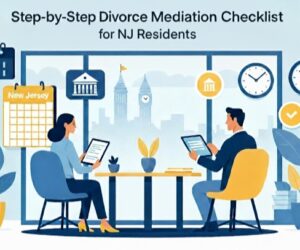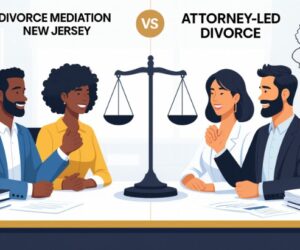
Getting divorced in Monmouth County can feel overwhelming. Mediation, though, often offers a more peaceful way forward than those drawn-out court battles.
Monmouth County offers multiple mediation resources through its Family Division court programs, legal aid services, and certified private mediators to assist couples in resolving divorce disputes outside the courtroom.
This collaborative approach allows families to maintain control over their decisions. It usually reduces both costs and emotional stress—who wouldn’t want that?
Divorce mediation in Monmouth County works differently from litigation. It focuses on cooperation instead of conflict.
Couples sit down with trained mediators and discuss significant issues, such as child custody, property division, and support payments. These conversations happen in private, not in a courtroom packed with strangers.
The process usually moves faster than court cases. It costs much less than hiring separate attorneys for each spouse.
Knowing what resources are available makes a real difference when choosing mediation in Monmouth County.
There are court-connected programs, community support services, and private options to fit different budgets and family situations.
Key Takeaways
- Monmouth County offers free and low-cost mediation programs through the Family Division and legal aid organizations.
- Public help centers and community resources can provide valuable support during divorce.
- Coastal Business Services can help prepare you financially for mediation, making the process smoother and more productive.
How Divorce Mediation Works in Monmouth County

Divorce mediation in Monmouth County follows a structured process. It helps couples resolve disputes outside of court.
This alternative dispute resolution method brings spouses together with a neutral third party. Both people have to agree to participate.
A trained mediator facilitates discussions about property division, child custody, and support payments. These sessions typically take place in a private office.
The mediator guides the conversation and encourages the couple to make their own decisions. Their job is to facilitate communication and explore solutions between both sides.
During the mediation process, couples discuss their issues openly while the mediator remains neutral. Sessions typically last one to two hours, and may be held weekly or bi-weekly.
The divorce process through mediation usually takes about three to six months. The timeline depends on how quickly both sides reach an agreement.
When couples agree on terms, the mediator prepares a memorandum of understanding. This document outlines all the agreements the couple made during their sessions.
Each party’s attorney reviews the memorandum. After that, it goes to the court for a judge’s approval before the divorce becomes final.
Mediation sessions are confidential and can’t be used as evidence in court if mediation fails. This privacy really encourages honest conversation.
Coastal Business Services assists Monmouth County couples in preparing for divorce mediation by organizing their finances and reducing stress. Start building your path to resolution today. Contact us to schedule your consultation.
If you’re ready to get started, call us now!
Monmouth County Family Division — Court-Connected Mediation Programs
The Monmouth County Family Division offers two main court-connected mediation programs. These help families resolve disputes without jumping into traditional litigation.
One program focuses on child custody and parenting arrangements, while the other deals with financial matters, such as property division and support.
Custody & Parenting Time Mediation
Court-connected custody mediation helps parents create parenting plans without going to trial. Trained mediators work with both parents to develop custody arrangements.
Parents meet with neutral mediators in a confidential setting. Mediators guide discussions about parenting schedules, decision-making, and communication methods.
Key Benefits:
- Faster resolution than court proceedings
- Lower costs compared to litigation
- Parents maintain control over decisions
- Reduces stress on children
Mediation usually takes two to six sessions. Each session lasts about two hours and focuses on what’s best for the kids.
Mediators help parents sort out holiday schedules, vacations, and school decisions. They also work on communication strategies.
If parents reach an agreement, the mediator writes up a parenting plan. The court reviews and approves it before it becomes legally binding.
Economic Mediation
Economic mediation helps divorcing couples find common ground on dividing shared property and figuring out support amounts. This court program focuses only on financial issues in divorce cases.
Trained economic mediators work with couples to resolve property division disputes. They address asset values, debts, and support calculations.
Common Issues Addressed:
- Real estate division – Family homes and investment properties
- Retirement accounts – 401(k)s, pensions, and IRAs
- Business valuations – Family-owned enterprises
- Spousal support – Amount and duration determinations
Both parties have to disclose their finances. Couples bring in income statements, tax returns, and asset paperwork.
Economic mediators use standard guidelines for support calculations. They help couples understand New Jersey’s equitable distribution laws.
Sessions focus on practical solutions rather than emotional issues. Mediators stay neutral and don’t give legal advice.
If mediation is successful, the couple will have a written agreement that covers all financial terms. After court approval, it becomes part of the final divorce decree.
Legal Aid And Low-Cost Mediation Resources

Several organizations in Monmouth County offer free or low-cost legal help and mediation for divorcing couples who can’t afford private attorneys.
These resources provide residents with professional guidance on child support, alimony, and other divorce-related matters, regardless of their financial situation.
Monmouth County Family Division Help Desk
The Monmouth County Family Division runs a help desk for people representing themselves in divorce and family law matters. Staff provide basic info about court procedures and forms.
They help folks understand the divorce process and explain how mediation fits into the court system. They can’t give legal advice, but they offer procedural guidance.
The help desk provides assistance with questions about child support calculations and alimony guidelines. Staff explain how to fill out paperwork and what to expect in court.
This resource is invaluable for people representing themselves. The help desk is open during regular court hours, and you don’t need an appointment for basic info.
Legal Aid Society of Monmouth County
The Legal Aid Society of Monmouth County is a certified nonprofit that helps indigent and disabled residents. They focus on people who can’t afford private lawyers.
Their services include guidance on divorce matters and mediation options. They help eligible clients understand their rights around child support and alimony.
The organization operates out of the Social Services Building in Monmouth County. Clients must meet specific income requirements to qualify.
Staff attorneys can represent clients in court or assist them in preparing for self-representation. They also give referrals to other resources when needed.
Legal Services of New Jersey (LSNJ)
South Jersey Legal Services has a Monmouth County office at 303 West Main Street in Freehold. This nonprofit serves low-income people across nine counties, including Monmouth.
SJLS offers legal representation and advocacy. Their family law services include help with divorce mediation and related issues.
The organization helps clients with child support modifications and alimony disputes through mediation whenever possible. They attempt to resolve family matters outside of court when it is feasible.
Clients can call the Freehold office at (732) 414-6750 to check eligibility. Income guidelines determine who qualifies for free legal help.
Before your first mediation session, Coastal Business Services can assist you in preparing documents, budgets, and financial plans to facilitate smoother negotiations. Contact us today to get ready with confidence.
If you’re ready to get started, call us now!
Community And Support Services For Families
Families facing divorce in Monmouth County can tap into specialized court resources, local support groups, and counseling services. These supports help with both legal and emotional challenges during tough transitions.
Family Court Resource Center
The Monmouth County Family Court Resource Center assists families in handling divorce cases without the need for lawyers. Staff assist parents in completing paperwork for child support, custody, and parenting time.
The center provides access to computers and printing services for legal documents. Parents can get help with forms for divorce complaints, answers, and motions.
Key Services Include:
- Help with forms
- Guidance on preparing legal documents
- Computer and printer access
- Information on court procedures
- Referrals to local legal aid
Walk-in hours are available weekday mornings. Appointments are possible for more complex cases.
The center doesn’t give legal advice but helps families understand court processes and requirements. It’s a good option for those who just need a nudge in the right direction.
Divorce Support Groups
Local support groups meet regularly across Monmouth County to help parents and kids cope with divorce. These groups offer peer support and practical advice for managing big family changes.
DivorceCare Groups meet weekly at churches and community centers. Sessions cover topics like anger, helping children adjust, and rebuilding after divorce.
Children’s Support Programs help kids ages 6-17 understand divorce and build coping skills. Groups are split by age to meet specific needs.
Many groups are free or charge minimal fees. Some require advance registration, while others welcome walk-ins. Monmouth County residents can find programs through local organizations.
Counseling And Wellness Services
Professional counseling helps families deal with emotional challenges during divorce. Licensed therapists offer individual, couples, and family therapy.
Individual Therapy supports adults as they process grief, anger, and anxiety. Sessions focus on healthy coping and emotional resilience.
Child Therapy addresses behavioral changes and school problems. Play therapy is often effective for younger children, while teens typically benefit more from talk therapy.
Family Therapy helps parents and children communicate better during transitions. Therapists guide families as they set new routines and boundaries in separate homes.
Most insurance plans cover mental health services. Community mental health centers offer sliding-scale fees for families with limited incomes.
How Coastal Business Services Supports Divorce Mediation Clients

Coastal Business Services provides structured, confidential mediation services that enable clients to remain in control of their divorce outcomes.
They create a calm space for couples to talk through tough financial and parenting issues. It’s not always easy, but they step in to make those conversations doable.
The company offers comprehensive divorce mediation in Monmouth County, eliminating the need for court appearances.
Neutral mediators help couples sort out key issues, including:
- Parenting plans and custody arrangements
- Asset division and property distribution
- Support payments and financial obligations
They focus on turning conflict into mutually beneficial agreements. Mediation sidesteps the drawn-out litigation and unexpected costs associated with traditional divorce.
Coastal Business Services places a strong emphasis on maintaining healthy co-parenting relationships. They help folks navigate divorce while keeping personal matters out of the courtroom.
Their team serves several locations, including divorce mediation in Middletown, NJ. They go beyond basic mediation and also offer comprehensive financial guidance.
Key benefits of their approach include:
| Service Feature | Client Benefit |
| Confidential process | Privacy protection |
| No court requirements | Reduced stress |
| Fixed costs | Budget predictability |
| Neutral facilitation | Fair outcomes |
Their team blends mediation skills with financial know-how. They handle both the emotional and practical sides of divorce settlements—honestly, that’s not something you see everywhere.
How To Choose The Right Mediation Path In Monmouth County
Choosing between mediation and litigation really depends on your situation. Each path has its own quirks and challenges for divorcing couples.
Consider Mediation When:
- Both parties can communicate respectfully
- You want to save money on legal costs
- Privacy matters more than public court records
- Children’s well-being is the top priority
Choose Litigation When:
- One spouse hides assets or income
- Domestic violence is present
- Power imbalances make fair negotiation impossible
- Complex business valuations are involved
The collaborative process offers a middle ground between mediation and traditional court battles. Trained professionals help couples reach agreements outside court.
Key Factors to Evaluate:
| Factor | Mediation | Litigation |
| Cost | Lower | Higher |
| Time | Faster | Slower |
| Privacy | Private | Public record |
| Control | High | Limited |
A qualified divorce attorney can help you figure out which path fits best. They’ll assess asset complexity, your communication style, and whether you’re emotionally prepared for the process.
Conclusion
Divorce mediation in Monmouth County offers couples a viable alternative to traditional court battles. It allows families to resolve disputes privately and often with less hassle.
Key Benefits Include:
- Lower costs compared to litigation
- Faster resolution times
- Private and confidential sessions
- Less stressful environment
Mediation addresses significant issues, including child custody, support payments, and property division. Professional mediators step in to help couples find agreements that actually fit their lives.
Courts often require mediation before a case can move to trial. This rule keeps court dockets lighter and encourages people to seek more cooperative solutions.
The New Jersey court system encourages mediation as a way to resolve disputes. You’ll find plenty of experienced mediators working in Monmouth County.
Experienced mediators are familiar with local court rules and the requirements of the process. They guide couples through each step and stay neutral throughout.
Mediation is most effective when both spouses participate willingly. It takes honesty and some good faith from everyone at the table.
Many families report feeling more satisfied after completing mediation. When kids are involved, they often manage to maintain better relationships post-divorce, too.
Make your mediation count with Coastal Business Services—clear financial preparation today leads to stronger agreements tomorrow. Contact us now to start planning your next chapter.
If you’re ready to get started, call us now!
Frequently Asked Questions
Is divorce mediation required in Monmouth County?
Yes. Custody and parenting time mediation is often mandatory, and economic mediation may be ordered for unresolved financial matters.
How much does divorce mediation cost in Monmouth County?
Court-connected custody mediation is free, while economic mediation may involve mediator fees. Private mediation costs vary depending on the complexity and duration of the session.
Q3: Can I attend mediation without my spouse?
No. Both parties must participate in mediation sessions for the process to move forward.
How long does mediation usually take?
Custody issues may be resolved in 1–2 sessions; complex financial matters can take weeks or months, depending on the level of cooperation and the readiness of documentation.
Can I bring an attorney to mediation?
Yes. You may attend with or without an attorney, but legal guidance can help ensure your rights are protected.
Will the mediator decide the outcome?
No. Mediators guide discussions but do not make binding decisions. Both parties must approve any agreement reached.
How can I prepare for mediation?
Gather financial documents, create a list of priorities, and consider consulting with Coastal Business Services for help organizing your finances before sessions begin.





